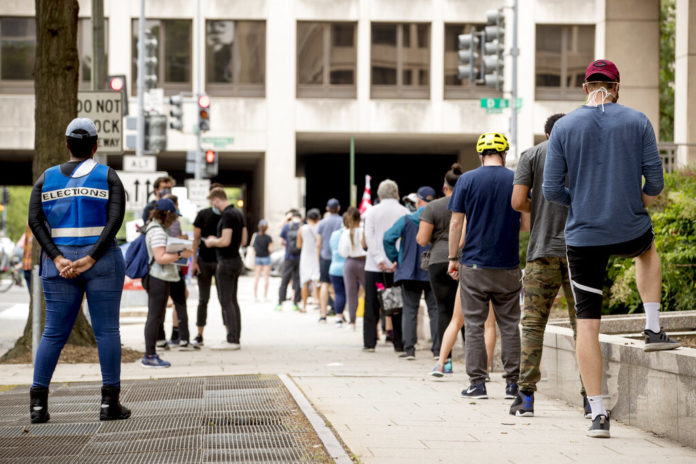
Voters navigated curfews and health concerns in a slate of primary contests on Tuesday that tested the nation’s ability to host elections amid dueling crises and moved Joe Biden closer to formally clinching the Democratic presidential nomination.
In all, nine states and the District of Columbia held elections, including four that delayed their April contests because of the coronavirus outbreak. With no real competition, Biden and President Donald Trump easily won their respective primary elections in Indiana, Rhode Island, Maryland, New Mexico and the night’s biggest prize: Pennsylvania. Biden also won South Dakota.
Voters waited in long lines that brushed up against curfews in Washington, D.C., and Philadelphia, two cities rocked by protests following the police killing of George Floyd. Officials in both places said voters wouldn’t be arrested for breaking curfew, but thousands of protesters defied the mayors’ orders at the same time, setting up a potential clash with law enforcement agencies and National Guard troops patrolling the streets during a fifth night of social unrest.
Pennsylvania, which offered the day’s biggest trove of delegates, also represented a significant test case for Republicans and Democrats working to strengthen their operations in a premier general election battleground.
Voters were forced to brave long lines in “militarized zones” because officials consolidated the vast majority of polling places in Philadelphia to minimize health risks, according to Erin Kramer, executive director of One Pennsylvania. She noted that some polling places in African American communities are in police stations.
“Having to stand in line while police officers are entering and exiting the building on police business is not exactly how people want to spend their election day,” Kramer said.
Biden was on the primary ballot in almost every state in his bid to unify Democrats behind his campaign against Trump. The former vice president is already the presumptive Democratic presidential nominee, given that all his rivals have dropped out of the race, but he needs to win 89% of all delegates at stake on Tuesday to formally clinch the nomination.
If he doesn’t secure the needed delegates Tuesday, he has other opportunities to do so this month.
Biden was in Philadelphia on Tuesday morning to deliver remarks about the civil unrest that has erupted across the nation. He didn’t talk about the primary, instead focusing his attention on Trump, whom Biden blasted as “more interested in power than in principle.”
Vermont Sen. Bernie Sanders is not actively campaigning, having suspended his operation and endorsed Biden, but his name will appear on the ballots. On the eve of Tuesday’s primaries, senior adviser Jeff Weaver encouraged progressives to vote for Sanders anyway.
“People who support Bernie Sanders and his agenda, who want to maximize the influence of progressives at the convention, should cast their vote for Bernie Sanders,” Weaver said, reminding voters that the Vermont senator is seeking leverage to shape the party’s platform and rules.
The comments serve as a reminder that Biden may have no legitimate Democratic rivals remaining but must still win over skeptical activists from his party’s far-left flank, who worry he’s too close to the political establishment.
Party unity will likely be an afterthought this week, however, as more immediate health and safety concerns dominate the national conversation. The coronavirus death toll has surged past 100,000 nationwide, and thousands of new cases are reported each day.
At the same time, several major cities, including some voting Tuesday, are grappling with protests.
Some voters said Trump’s increasingly tough tone toward protesters inspired them to participate in the democratic process. Nicholas Autiello, who works in finance in Rhode Island, said he was disturbed by police driving back peaceful demonstrators near the White House on Monday.
“Last night, we have a president who is acting like a dictator,” Autiello said. “So being able to come out here this morning and fill in a circle next to a name for someone who I know will restore honor and decency to the presidency was so important.”
Political groups have had to adjust as some states move to a system that relies largely on voting by mail. They include Montana, where all 56 counties decided to vote entirely by mail. Voting rights watchdogs in multiple states have expressed concerns about access to mail ballots, confusion about deadlines and a shortage of poll workers that could lead to long lines.
Those voting Tuesday include the District of Columbia, Indiana, Maryland, Montana, New Mexico, Pennsylvania, Rhode Island and South Dakota. Two other states holding primary elections, Idaho and Iowa, chose its presidential nominee early in the year and is now focused on other offices.
“We are in unique times, and voting is a unique challenge for people,” said Josh Schwerin, chief strategist for the pro-Democrat super PAC Priorities USA. He said that his organization and others will be watching closely on Tuesday “to see how well it works, where issues are and where obstacles have been put in place.”
Republished with the permission of the Associated Press.












